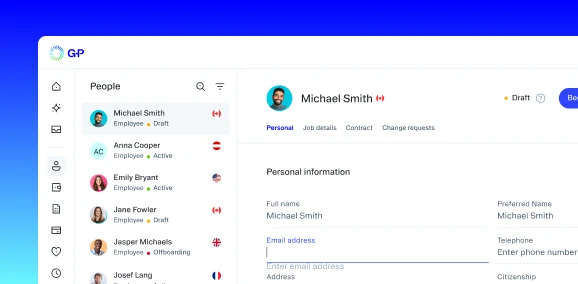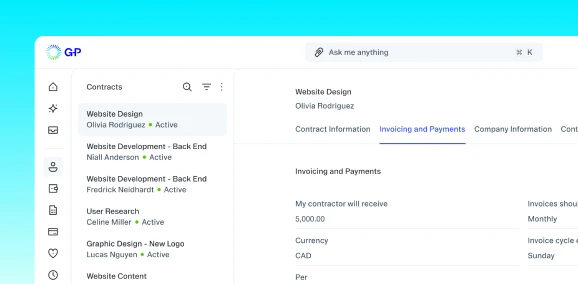Offering competitive compensation and benefits is essential for attracting and retaining top talent in Latvia. While your benefits plan must adhere to the country’s statutory requirements, providing supplemental benefits can set your company apart. Navigating Latvia’s compensation laws is also critical for maintaining compliance.
Managing compensation and benefits alongside hiring and entity setup can be complex and time-consuming. G-P’s Employer of Record solution for Latvia allows you to onboard talent and manage payroll and benefits seamlessly, ensuring compliance without the need to establish a local subsidiary first.
Latvia compensation laws
Understanding compensation regulations is the first step to building a compliant and competitive team in Latvia.
Latvia minimum wage
As of January 2026, the national minimum wage in Latvia has increased to €780 gross per month, and while standard workweek rules remain at 40 hours, the minimum salary for a general work permit has risen to €1,685 and the EU Blue Card threshold is now €2,528 per month.
Key 2026 compliance updates
-
Minimum wage: The monthly rate increased by €40, moving from €740 (2025) to €780 (2026).
-
Foreign workers: The general work permit threshold is tied to the national average salary, which is now €1,685 per month gross.
-
EU Blue Card: The requirement is 1.5 times the average salary, totaling €2,528 per month, or €2,022 for shortage occupations (1.2x).
-
Overtime: Compensation remains at 100% premium (double pay) by default, though some collective agreements may allow for a 50% premium if specific conditions are met.
-
Tax-free minimum: The non-taxable minimum for personal income tax has also increased to €550 per month for 2026.
Statutory benefits in Latvia
All employees in Latvia are entitled to certain statutory benefits. Your benefits plan must include these guarantees.
Public holidays and annual leave
Employees in Latvia are entitled to a paid day off for the country’s 12 public holidays. Additionally, all employees are guaranteed a minimum of 4 weeks of paid annual leave per year.
Sick leave
In the event of illness, an employee is entitled to paid sick leave. The payment structure is as follows:
-
Day 1: Unpaid.
-
Days 2-10: Paid by the employer. The employer pays at least 75% of the employee’s average earnings for days 2 and 3, and at least 80% for days 4 through 10.
-
From Day 11: The State Social Insurance Agency (VSAA) provides sickness benefits at a rate of 80% of the employee’s average insurance contribution wage, for up to 26 weeks.
Maternity, paternity, and parental leave
Latvia provides comprehensive leave entitlements for new parents:
-
Maternity leave: Pregnant employees are entitled to 112 calendar days of leave (56 before the birth and 56 after). During this time, the VSAA pays a maternity benefit at 80% of the employee’s average contribution wage, provided they are socially insured.
-
Paternity leave: Fathers are entitled to 10 working days of paid leave, which must be taken within 6 months of the child’s birth. This leave is paid by the VSAA.
-
Parental leave: After maternity leave, one parent can take parental leave until the child reaches 18 months of age. The VSAA pays a benefit during this period. Additionally, each parent has a non-transferable right to 2 months of parental leave until the child turns 8, in line with EU directives.
Learn more about maternity and maternity leave around the world.
Social security contributions
Employers and employees must contribute to the state social insurance fund, which covers pensions, unemployment, healthcare, and other social benefits. The standard contribution rates are:
-
Employer contribution:
23.59%
-
Employee contribution:
10.50%
Different rates may apply for specific groups, such as individuals past retirement age or those in special tax regimes.
Designing a competitive benefits plan in Latvia
While statutory benefits are mandatory, offering additional perks is key to attracting and retaining top talent. To create a competitive package, employers should consider market standards and employee expectations.
Common supplemental benefits in Latvia include:
-
Private health insurance to supplement state-provided care
-
Contributions to a private pension plan
-
Company car or transportation allowance
-
Bonuses and performance-based incentives
To design an effective plan, you should first establish a budget based on your company’s revenue. Researching what competing companies in your industry offer can provide valuable insight into local market expectations. This will help you allocate your budget effectively, covering mandatory benefits first and then adding perks that provide the most value to your employees.
Taxation of benefits in Latvia
In general, most benefits and compensation provided to an employee are considered part of their taxable income. Benefits-in-kind, such as a company car for private use or private health insurance premiums above a certain threshold, are typically taxed at their market value.
Partner with G-P to build your global team
With G-P — the #1 Rated Global Employment Platform — you can offer global employees local, competitive benefits that are continuously updated by our in-house experts to meet country-specific regulations and norms. Easily administer benefits plans through ourEOR platform to provide a smooth employee experience.
Learn more about our platform and request a proposal today.




















